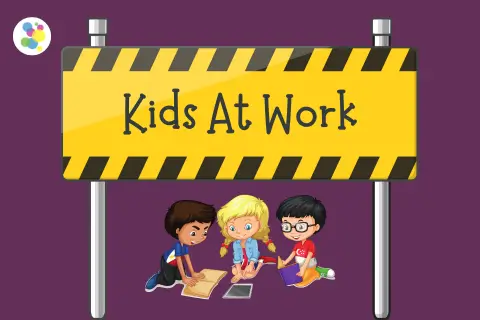I recently came across an Instagram reel with the caption “Bro gonna grow up to be the best therapist.” The video showed a toddler crying her eyes out while her brother, seated next to her at the table, glances up and asks, “Did you have your nap today?” The toddler wails, “I DIDN’T!!!” It was heartwarming to watch, but the video got me thinking about an essential aspect of our children’s growth that we as parents often do not give enough credit to – routines.
Yes, that dull old word that might make you yawn with boredom, but sets the tone for the way children develop, form memories, build relationships, and learn about themselves and the world. The wise brother in the video was quick to understand that his baby sister was feeling cranky and irritable because of a sudden change in her routine – no nap today! ☹
Ah, the routine! The villain of fun times
But why do we think of routine as the bad guy, the crusher of our joyful (yet chaotic) life? As human beings, we thrive on routines – we eat three basic meals a day; we work during the day and sleep at night. We hardly realize that as we go, we create patterns for ourselves, we set expectations in our minds, and we delegate everything we do into separate mental schemas. This very same routine can help kids develop holistically and also parents maintain stability amidst the chaos.
Whether you’re dealing with infants, toddlers, preschoolers, or the older, wiser kids, routines are essential. They bring stability, structure, and a sense of security to your little ones’ lives. Have you ever taken your child on a plane and spent the entire flight trying to calm them down as they cry? You must have realized by now that they get upset if there is a change in their routine.
Building routines need not be rigorous and severe. Rather, they should be a “fun” and normal process. They create a steady rhythm that helps the kids thrive while leaving room for their unique personalities to shine.
Do you want to know how you can create a routine for your child?
We’re ready with some nifty ideas on how to set up a routine that works for all – preschoolers, school-age kids, and older kids.
How to set a routine for pre-schoolers?
Among preschoolers, routines are instrumental in building skills, language, and cognitive development. Most commonly, children learn self-care, emotional regulation, and time management through routines. Further, children feel safe in the consistency and predictability of routines.
- Set a consistent sleep schedule: Remember the video I spoke about? Adequate sleep during fixed intervals is an essential habit that will ensure they get sufficient rest and regulate their emotions throughout the day.
- Stick to regular meal times: Set regular times for breakfast, lunch, dinner, and snacks to maintain a nutritious diet and encourage healthy eating habits.
- Allocate time for learning through play: Create dedicated periods for both structured and unstructured play, as well as learning activities such as reading, puzzles, and arts and crafts. More importantly, dedicate some time solely to playing with the child or helping them learn a new activity.
- Incorporate self-care activities in the routine: Habits built around personal hygiene, such as brushing teeth, bathing, dressing, and tidying up toys, often accompanied by a cheerful song or rhyme, are hard to break and pretty enjoyable.
- Communicate the routine visually: Use visual cues like charts, pictures, or a daily schedule to help preschoolers understand and follow the routine. You can even utilize stickers or toys to reward your kid for fulfilling specific tasks, instilling a sense of responsibility, independence, and accountability in them.
How to set a routine for school-age children?
Routines help school-age children to learn time management skills, think and act independently, and with a sense of responsibility. A school-going child’s routine is built around their school timings and any number of extra-curricular or social activities they may be involved in. It is doubly necessary to form positive habits that will help them go through their day calmly. Here are some steps to ensure their day goes by without a hitch.
- Plan study and homework time: Allocate specific periods for homework, study, and project work, considering their interests and workload.
- Include slots for regular physical activity: Set aside time for exercise, sports with friends, or other activities to take care of physical health and well-being.
- Encourage extracurricular involvement: Allocate time for pursuing hobbies, clubs, or community activities of interest to your child. Don’t overdo it; a few times a week should be enough.
- Spend time with family: Include designated periods for family meals, conversations, and shared activities and allow the kids to build healthy relationships.
- Allocate “Me” Time: At least twice a week, let children spend some time with themselves. It is an important way to practice self-care. They can choose to do any number of things during this time, like journalling, drawing, reading, or even introspecting on how their day went.
How to set a routine for older children?
Routines help older children become independent and disciplined and manage stress. It helps them set goals and work towards achieving them. Routines are essential in preparing older children for adult life.
- Collaborate on schedule creation: Involve your child while setting up the schedule to encourage ownership and ensure it aligns with their goals and interests.
- Prioritize academics: Allocate sufficient time for studying, completing assignments, and preparing for tests, considering your child’s academic aspirations.
- Include time for hobbies and interests: Plan dedicated time for activities your child enjoys, such as music, sports, art, or other personal interests.
- Allocate sufficient time for self-care: Ensure your child has time for relaxation, self-care, and pursuing activities that help them unwind and recharge.
- Build time management skills: Help your child learn effective time management techniques, such as creating to-do lists and using reminders to keep track of their schedules. However, ensure you do not nag the children into doing things that they might not be interested in.
What should you bear in mind while crafting a routine for your child?
Every child is unique, and their requirements vary with age, interests, and socio-cultural differences. Make sure the schedules you draft fit your child’s personality, preferences, and developmental stage.
Routines are not just about organizing chaos; they are about nurturing healthy habits, fostering growth, and creating an environment where children can prosper. They provide a roadmap for daily activities, teach essential life skills, and instil a sense of responsibility and ownership. They set the stage for success in all areas of a child’s life.
As parents and caregivers, it is up to us to be the architects of these routines, crafting them with love, creativity, and flexibility. By doing so, we empower our kids to become independent individuals who can navigate the world with grace and resilience.
To borrow a few wise words from Aristotle – We are what we repeatedly do!



2 Comments